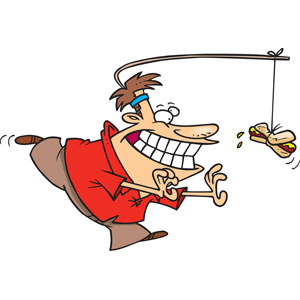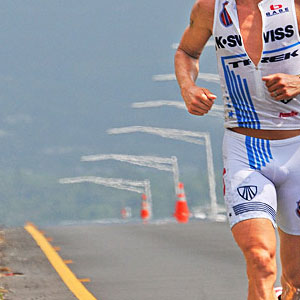My relationship with food

When you and I were young we established our relationships. Not just with people, but also our relationships with alcohol, drugs, cigarettes—those to whom we're sexually attracted—as well as our relationships to bosses, employees, parents, religion, politics.
We also formed relationships with work and leisure time, with schedules, with hygiene, with our approaches to concepts like discipline, virtue, loyalty, steadfastness.
As we age, some of those relationships prove unhealthy or dysfunctional. Those who formed bad relationships with alcohol, for example, found they needed to redefine those relationships. I'm on my second marriage, and happily so. But in between my two marriages I decided to take a look at the way I approached romance: what I looked for in a woman, what sort of woman was best for me, and not only what I wanted in a woman, but what I was prepared to offer in return.
I think success and happiness requires a dose of luck, but depends more on our initial establishment of relationships, as well as our willingness to examine and redefine these relationships throughout our lives, as they are found wanting. Success is proportional to our abilities to self-correct.
Against that backdrop, I'd like to talk about my relationship with food and eating. Food is tricky. If you think about it, there are three possible relationships you can have with alcohol, and two are good. Not drinking, and moderate drinking, are each good. Only drinking too much is bad.
Food is different. Eating too much is bad. Eating too little is bad. Binging and purging is bad. Only eating the correct amount is good.
When I was young, I enjoyed the luxury of eating whatever and however much I wanted, and I stayed thin as a rail. That lasted until the age of 18. Since then, my eating habits were not in sync with my basal metabolic rate plus reasonable workouts. Only an exceptional amount of aerobic work over a fairly long duration got me to target weight.
The older one gets, the more difficult that calculus becomes.
Something happened last week. I contracted food poisoning, or, maybe it was the mother of all stomach flus. This sort of thing rarely happens to me. But something like it has happened to me several times in my adult life, and that is altitude sickness. It's the world's worst headache, with the world's worst stomach flu, all packaged for your pleasure.
I spent about 30 very uncomfortable hours last week, and this is the third time in the past year my entire digestive tract has been emptied, top to bottom. The other two occasions were voluntary: a nuclear stress test, and a colonoscopy.
The difference is, after my colonoscopy, I was ready to eat. After my food poisoning, I was not. I looked at food—any food, even food I was quite sure was good, healthy, clean—with suspicion. It was not the food itself, but my stomach's response to it, that caused my concern. My stomach has its own relationship to food, and in its traumatized state if it felt it wasn't ready for business-as-usual, whatever went it was coming right back out.
Then I though: My relationship to food had changed (though only temporarily).
When I thought about my previous experiences with altitude sickness, these episodes always happened during peak training and racing season. I was training for something. That's why I was at altitude. It was always the going to altitude and working out too hard, too soon after arriving, that caused my altitude sickness.
And the occasion of already being in a desired training spot caused me to come back from a flat-on-my-back posture quickly. I was in God's country, so was my bike, I needed to get back on and go.
Because of this confluence of events—very bad GI distress and reticence to eat, followed by several more days of flat-out training—I always came back from these experiences fit as a fiddle and considerably lighter.
Now, don't get me wrong. I don't recommend a dose of food poisoning as a training tactic. Salmonella is not the new EPO. Rather, I'm simply relating a set of historical experiences that form a context for what I'm now writing.
But I must tell you that as I lay there in bed this past week, in the fetal position, or prostrate at the porcelain throne, I did think: I'm going to find the silver lining in this.
I took two days off during my illness, and I've just had my third consecutive training day. My workouts have been remarkably good considering how weak I felt. Yet I don't think a few pounds I might've lost over the past several days is the payoff. I think the silver lining ought to be more than just a hard-won half-inch lost on my waistline.
What I'm hoping is to hit the reset button on my approach to food. Rather than eating everything served to me; rather than ordering the "choice of three" rather than "of two," just to make sure I get enough food; rather than putting a bit more pasta into the boiling pot, out of fear I might finish my meal still hungry; rather than shoveling the food in until I'm uncomfortably full; I'm hoping to recalibrate my response and approach to food, so that none of the above describes my habits.
Once I heard a "testimony" from a young man talking about his past life with alcohol. He related how he became a heavy drinker in his mid-teens. He then discovered a life of sobriety. In his college fraternity days he resumed drinking, realized his error, and again chose sobriety. Then the rigors of work, the entertaining of clients, and the cycle of addiction and sobriety.
As he spoke, and as I did the math, I realized he was telling others about his success over alcoholism only a scant few months after his last fall off the wagon. There are likely more chapters to this story yet to be written, I thought.
I would think the same thing if I were you, reading what I'm writing here. Maybe in a couple of months I'll be ordering a double double with cheese, and fries… and another order of fries, just to be on the safe side.
Still, I think success not only relies on the wise choice of a set of habits and relationships, but the ability to choose again, when an earlier pattern of behavior requires a new approach. I've recalibrated before and it has stuck. Why not now?
As my best friends know, I have my soft underbelly, figuratively and literally. Place me in front of an ascent averaging 7 percent, with 6000 feet of vertical, and that I'm happy to contemplate. Place me in front of a bathroom scale, not that scares the bejeesus out of me.
And fear is really what it comes down to, isn't it? Fear of eating too little and the consequential hunger; fear of eating too much and the consequential weight gain. I eat like my dogs eat: The next kill might be three days off. I can't be happy going through life like that, can I? To be clear, my hope and goal is not to walk away from each meal hungry and miserable. Rather, to recalibrate what "satisfaction" at the end of a meal means. What I want it to mean is "enough" rather than "topped off."
Upon this ocean I set sail, like Columbus on the Atlantic, not knowing exactly how things will end up. Success for Columbus meant finding the Spice Islands and China. I'll be happy if I'm sprinkling Spice Islands over a little less food atop my china. When you see me at the races, you'll probably know how my journey is working out.


